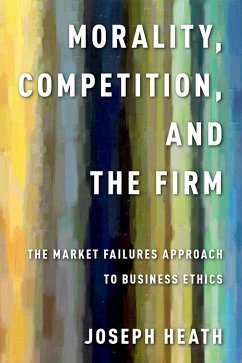
Morality, Authority, and Law (eBook, PDF)
Essays in Second-Personal Ethics I

PAYBACK Punkte
10 °P sammeln!
Stephen Darwall presents a series of essays that explore and extend the Second-Person Standpoints argument that central moral concepts are irreducibly second personal, entailing mutual accountability and the authority to address demands to one another (and ourselves). He illustrates the second-personal frameworks power to illuminate a wide variety of issues in moral, political, and legal philosophy. Section I concerns morality: its distinctiveness among normative concepts, the metaethics of bipolar obligations (owed to someone); the relation between moral obligations form and the substance of ...
Stephen Darwall presents a series of essays that explore and extend the Second-Person Standpoints argument that central moral concepts are irreducibly second personal, entailing mutual accountability and the authority to address demands to one another (and ourselves). He illustrates the second-personal frameworks power to illuminate a wide variety of issues in moral, political, and legal philosophy. Section I concerns morality: its distinctiveness among normative concepts, the metaethics of bipolar obligations (owed to someone); the relation between moral obligations form and the substance of our obligations; whether the fact that an action is wrong is itself a reason against action (as opposed to simply entailing that sufficient moral reasons independently exist); and whether morality requires general principles or might be irreducibly particularistic. Section II consists of two essays on autonomy: one discussing the relation between Kants autonomy of the will and the right to autonomy, and another arguing that what makes an agents desires and will reason-giving is not the basis of internal practical reasons in desire, but the dignity of persons and shared second-personal authority. Section III focuses on the nature of authority and the law. Two essays take up Joseph Razs influential normal justification thesis and argue that it fails to capture authoritys second-personal nature, without which authority cannot create exclusionaryand preemptivereasons.The final two essays concern law.The first sketches the insights that a second-personal approach can provide into the nature of law and the grounds of distinctions between different parts of law.The second shows how a second-personal framework can be used to develop the civil recourse theory in the law of torts.
Dieser Download kann aus rechtlichen Gründen nur mit Rechnungsadresse in A, B, BG, CY, CZ, D, DK, EW, E, FIN, F, GR, HR, H, IRL, I, LT, L, LR, M, NL, PL, P, R, S, SLO, SK ausgeliefert werden.













